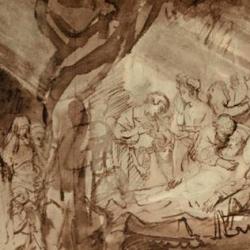To our modern democratic ear, “King of kings, Lord of lords” (1 Timothy 6:15; Revelation 17:14; 19:16) sounds redundant.
It’s not. The two superlatives are drawn from quite different contexts.
Yahweh is “Lord of lords” (Deuteronomy 10:17; Psalm 136:3). But the only figures described as “king of kings” in the Hebrew Bible are human beings – Gentile emperor like Artaxerxes (Ezra 7:12) and Nebuchadnezzar (Ezekiel 26:7; Daniel 2:37). Ancient emperors conquered kings, and so became king over kings.
To say that Jesus is Lord of lords is to say He is Yahweh. To say that He is King of kings is to say that He is the Fifth Monarch, the heir of the empires of Babylon, Persia, Greece, and Rome, the greater Nebuchadnezzar, Cyrus, Alexander, Augustus.
To say that He is both Lord of lords and King of kings is to say that He is the divine emperor, the Lord of lords made flesh as King of kings.
And in Revelation, the point of the title “King of kings” is more specific. The “kings of the land” who oppose Jesus are the leaders of Judaism and of Judaizers; the “kings” who are with Jesus are the saints. Jesus is divine Imperator in that He is head of the church, a people made kings and priests to God. As the greater Cyrus, Jesus presides over the fifth emperor, the church.















